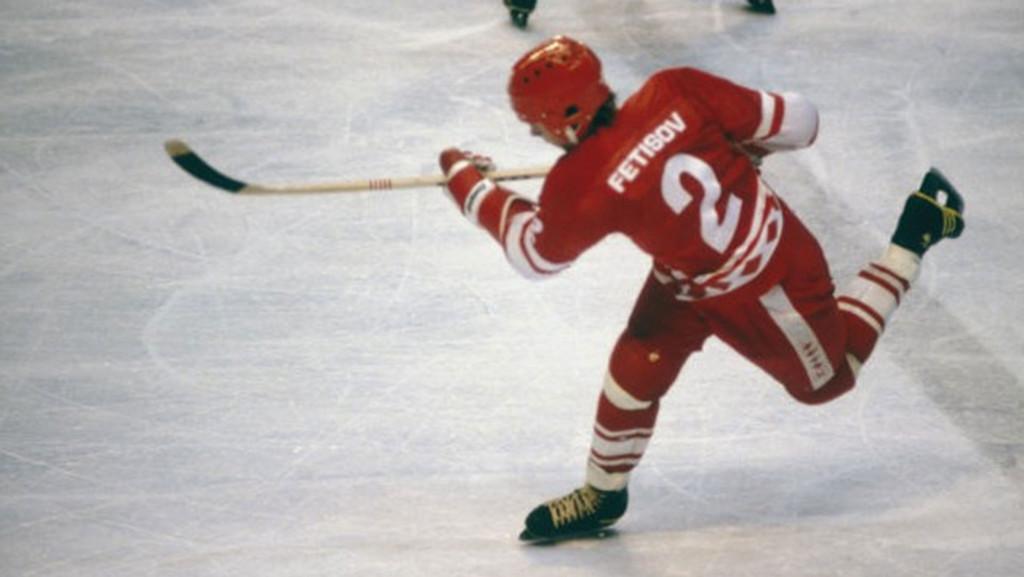It’s the end of the 20th century in the aftermath of the the once-mighty Soviet Union, now a crumbled shadow of its former self. Soviet hockey players are beginning to leave their shambling economy for a brighter future in the National Hockey League. Onscreen, an Internet video of a former Russian player-turned-NHL all-star plays as he demonstrates his shooting ability for America. Several Russian nesting dolls have been filled with condiments and tied to a goal for the player to shoot at with his stick. One by one, each puck makes its mark in an explosion of sauce and Russian pride. Now add former legendary Red Army defenseman and team captain Viacheslav “Slava” Fetisov as the narrator, listing after every shot what the Soviets were losing to the Americans.
With Fetisov at the epicenter, director Gabe Polsky crafts a deliciously wholesome account of the Soviet Union’s supremacy in the rink in the 2014 documentary, “Red Army.” The documentary follows the account of Fetisov and several other of the USSR’s greatest hockey players during the Cold War. Analyzing the politics, use of sports propaganda and the rising tension between the East and the West in the time of imperious communism, Polsky carries the audience through the later half of the 20th century through the eyes of a sports regime that was perhaps the Soviets’ most effective weapon against the U.S.
Fetisov, born into a system that prioritized sports above all else and selected the best of the best, recalls his rises and falls in the ongoing battle for glory that is hockey, the most popular sport in the USSR at the time. To put that on an even higher note, for many years he carried the burden of being the symbol of his country’s triumph over capitalism and faith in the Kremlin. Illustrated in sports footage of stunning shots and incredible feats of puck-passing, the Red Army team is shown to be unstoppable. It transformed the stereotypically brutish game of hockey into a finessed art form, spearheaded by its enlivening coach Anatoli Tarasov.
Later in the documentary, the dark side of being the Russian all-stars is seen when Tarasov is replaced by the ruthless, contemptuous Viktor Tikhonov as head of the Red Army team. Under Tikhonov, the entire team is put through the wringer: they are isolated in a sports training camp for 11 months a year, unable to see their families even in dire situations and put under days of excessive training and scarce luxuries. Tikhonov brings to the Red Army the brutality of the KGB, with such disrespect for his players that Fetisov questions his prompters as to what exactly they mean when they ask for a summary of his “relationship” with Tikhonov — “relationship” is too strong a word.
The thin line between hockey being a metaphor for the war between the U.S. and the USSR and it literally becoming war itself is crossed at a number of points throughout the players’ anecdotes. For a time, it was widely believed that the Soviets’ victory at the Olympic Games in Lake Placid, New York, would bring about the total victory of communism and the end of morale to capitalistic societies everywhere. The Soviet government was insistent on keeping its players confined within their society, unable to see how better off the rest of the world’s economies were, just as was given treatment to average citizens. The players couldn’t use their own passports for anything that wasn’t government-mandated and were essentially forced to be with only one another and no one else. With life and death on the line in some cases, it’s a riveting documentary constantly keeping the less historically aware audience on its toes.
The film has a happily cynical sense of humor, showcasing the stars’ own crude jokes, unedited takes or news of a hockey player’s defection as perfectly timed knee slappers. Against a backdrop in the colors of Russian propaganda, a mix of old and new cinematography blends nicely together with a satisfying soundtrack. Complementing it all, Fetisov is a wry and hardened speaker with more insight into the history of hockey than could be said for many.
Those interested in the Cold War, the tension between the U.S. and the Soviet Union or anyone who appreciates hockey would enjoy “Red Army.” This one does justice both for those with interest in documentaries and without, and it brings humor and perception to what some may consider the real war that the Soviets fought for dominance.




















